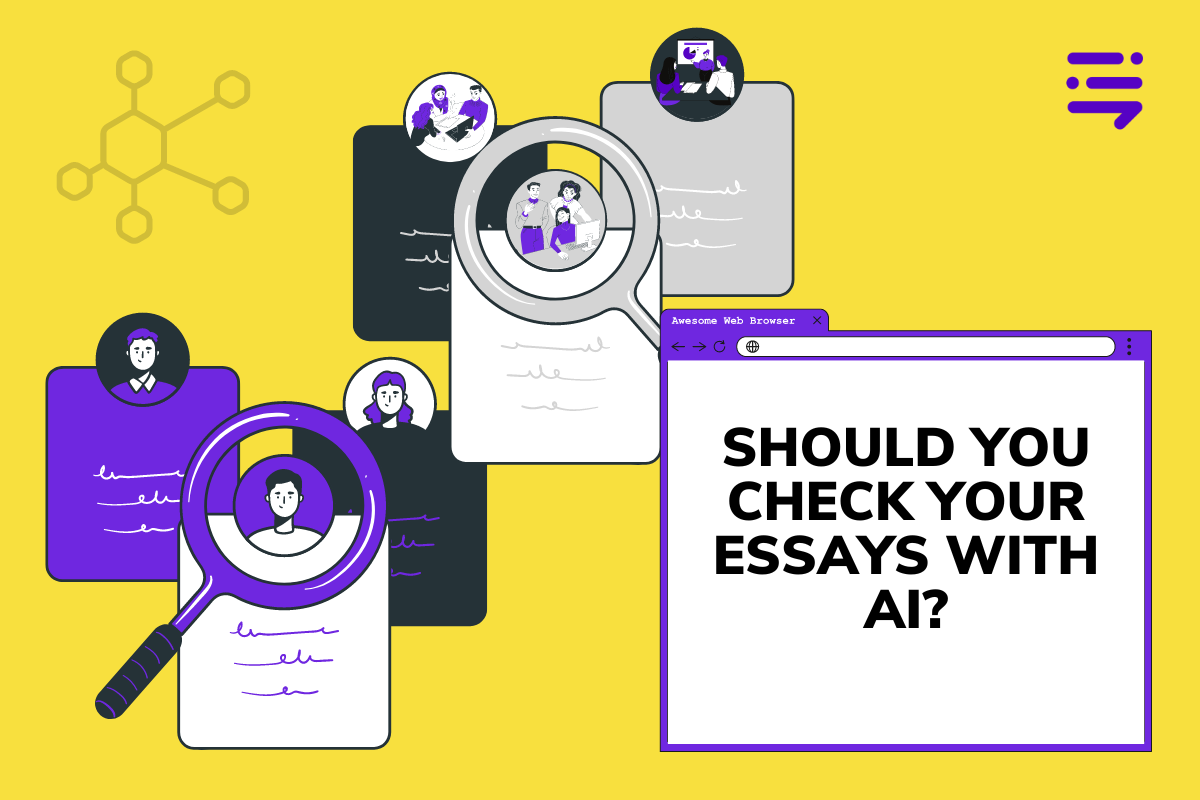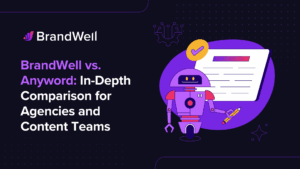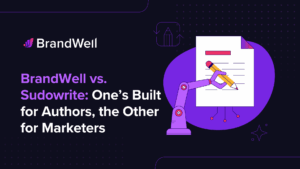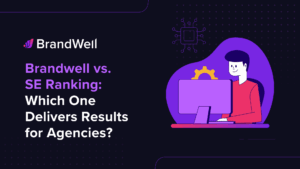I was on a podcast the other day, 10-Minute Tech Comm with Ryan Weber, a professor at the University of Alabama in Huntsville, to talk about AI writing.
Considering ChatGPT’s ability to produce human-like text and even pass essay questions on college and MBA exams, this topic is a huge one for the academic community.
Professors like Ryan are terrified of these recent AI advancements, not to mention healthily skeptical of how they can be used for good.
Meanwhile, a recent survey revealed that 43% of college students have used ChatGPT or a similar chatbot. Although half of them have tried it for assignments or exams, most are simply fascinated with the tech and are using it out of curiosity.
Here’s one stat that should ease some of the concerns from educators: 57% of college students do NOT intend to use AI to do their homework. Although 61% think ChatGPT will become the new normal, 51% believe that using AI tools for school counts as cheating or plagiarism.
In my interview with Ryan, I discussed the ethical considerations surrounding AI writing tools and automated content (including whether you should check your essays with AI), as well as:
- Why AI content creation is nothing to fear.
- How BrandWell works.
- The future of AI writing.
It’s all recapped right here.
And, since we’re on the topic of AI in academia, let’s talk about other related concerns such as plagiarism, academic dishonesty, and the impact of AI on students’ critical thinking skills.
Lastly, I’m going to share how professors and students can maintain the integrity of their work by using our AI detector tool.
Table of Contents:
- Embracing AI Content Generation
- The Rise of AI-Powered Chatbots in Academia
- The Drawbacks of Relying Solely on AI Tools for Writing
- Concerns over Plagiarism Using AI-Powered Chatbots
- Check Your Essays with AI & BrandWell
- Promoting the Ethical Usage of AI Technology in Academia
- How to Use AI Responsibly
- Fostering Ethical Behavior Around AI Technology Usage
- FAQs – Should You Check Your Essays With AI?
- Conclusion
Embracing AI Content Generation
AI is here, and if you can’t adapt, you’ll be left behind.
When we started building the BrandWell app in the summer of 2021, there were already close to a dozen AI writing tools out there. But I wanted to build something truly unique that addressed one major challenge for marketers like me: scaling a successful strategy.
To do this, you need to either expand your in-house team or hire a lot of freelancers. It’s an expensive foray when you’re trying to scale content marketing, and if you don’t have a really good team or a good process, it can get muddied up pretty quickly.
So instead of just creating an AI writer, we designed a tool specifically for long-form, SEO-driven content. With advanced algorithms that analyze keywords, readability scores, user intent signals, and other factors critical for search engine ranking, our app has become a popular choice for modern-day marketers.
What Does Google Say About AI Content?
In recent months, Google has shown an increasing willingness to accept automated content creation methods. The search engine giant even launched its own chatbot — Google Bard — in response to ChatGPT. This attitude shift opens up new opportunities for writers who are ready to embrace cutting-edge technologies to complement their existing skills.
Google has adapted its search guidelines to keep up with AI content. It now acknowledges that some forms of auto-generated content can be valuable when done correctly. These include:
- Educational resources: AI-driven platforms can create informative articles or tutorials based on user queries, providing helpful information tailored specifically to individual students.
- Data visualization: AI-generated charts and graphs can help users better understand complex data sets by presenting them in a more digestible format.
- Sports recaps: By analyzing game statistics and player performance metrics, AI tools can generate engaging summaries of sporting events without human intervention.
Integrating AI Into Your Writing Process
The cool thing about adding AI to your workflow is that your human writer who used to struggle to do 20 posts a month can now finish 10 a day. It’s just a real game-changer. Think of what you are able to accomplish when you don’t have to write from scratch, with the machine taking care of the entire process from research to the first draft.
Since you’re basically just editing the copy that the AI wrote and making it your own, you’re able to do so much more.
In short, you do the things the AI can’t do, like share expert advice, add photos or screenshots, or tie a story arc into your piece. These are things that AI is not going to be good at in comparison to a human that has emotions and experience.
The key to successfully integrating AI into your writing process is finding the right balance between AI writing and your human editing skills. While machine learning models can generate well-written content, it’s still important to give it a distinct personality for authenticity and emotional connection with your audience.
Here are some tips for effectively combining AI-generated content with traditional writing methods:
- Set clear objectives: Define your goals before using an AI writer. This will help you guide the AI so it stays focused on your topic.
- Edit and refine: Using AI-generated output as a starting point, you should edit and polish the text to add your personal voice, style, and insights.
- Incorporate research: Supplement machine-generated information with additional data from reputable sources like industry reports or academic studies.
Taking advantage of automated content creation does not mean abandoning traditional writing skills altogether. Rather, it presents an opportunity for writers to maximize their time without compromising quality or integrity.
The Rise of AI-Powered Chatbots in Academia
As AI advances, its use in the educational sphere has become increasingly widespread. With the rise of AI-powered writing tools, professors are becoming concerned about students misusing them in academic work.
OpenAI’s ChatGPT has made significant strides in generating human-like text across various lengths and styles. These advancements enable users to produce high-quality content quickly — but what happens when students use AI to produce college essays, assignments, and text?
Commercial versions of these tools without limits or restrictions have proliferated, raising concerns among parents and teachers about the potential use of these tools for cheating.
For a writing teacher like Ryan, the biggest thing he’s scared of is plagiarism. Are his students going to use ChatGPT to complete an assignment and turn it in?
AI is going to change how universities grade things. Obviously, they used to just check for plagiarism but now AI detection is a factor too.
Our team at BrandWell has developed our own AI detector tool and we’ve had requests to utilize it for scanning assignments first before they’re graded. Universities are clearly all over this since ChatGPT came out in November.
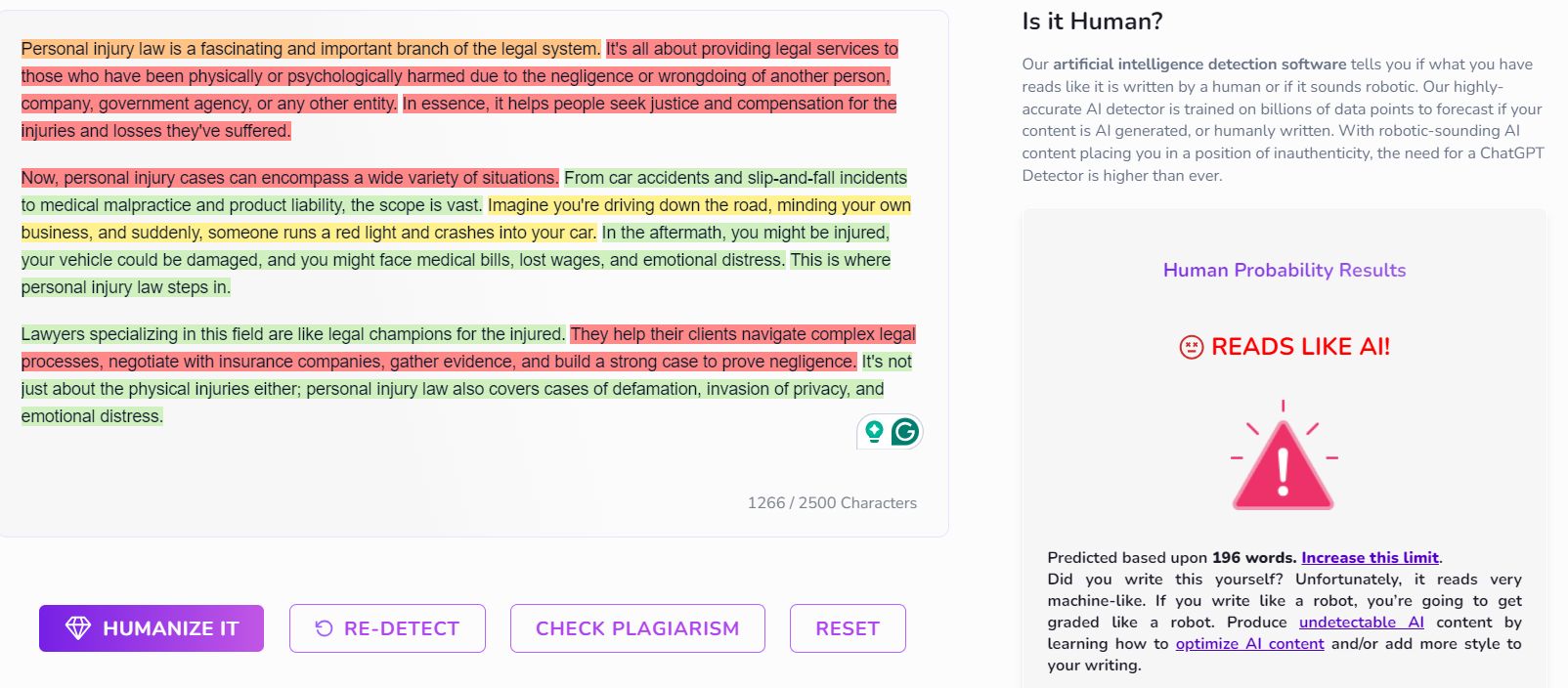
Should Students Use AI to Write Essays?
Technology should be used as a tool, not a shortcut to get a passing grade. And with college students often feeling overwhelmed with the amount of work they have to complete, one of the ways artificial intelligence can help is with essay writing.
What are the benefits of using an AI writing assistant?
- Improved writing: AI writing assistants like Grammarly and Hemingway can provide feedback on grammar, spelling, and sentence structure, helping students improve their writing skills over time.
- Faster turnaround time: Students can write papers more quickly using AI tools since these programs automatically format citations and references according to various styles such as MLA or APA.
- Better grades: By using an AI tool like a teaching assistant, students receive personalized feedback on their work which helps them identify areas where they need improvement. This results in better grades overall.
The Drawbacks of Relying Solely on AI Tools for Writing
AI tools should not replace human interaction entirely, however useful they may be. Here are some of the limitations of AI in writing essays.
Struggles with Reasoning and Critical Thinking
Language models generate responses based on what they learn during training. Therefore, they tend to falter when faced with complex questions from professors. This means relying solely on AI could lead to subpar results when tackling intricate subjects and arguments.
While ChatGPT excels at generating human-like text on any topic, it might not be the best solution for producing high-quality college essays that require reasoning skills.
Ambiguous Responses
Besides struggling with reasoning tasks, another drawback of using artificial intelligence for writing papers is its tendency to turn out an ambiguous response when presented with a difficult question. As a result, AI content may lack the clarity and coherence needed for academic work.
Students must remain cautious while using such technology since ambiguous answers can have a negative impact on the quality of their essays.
Lack of Creativity and Originality
Machines don’t have feelings, nor do they have the ability to think outside the box. So an essay that’s written completely by an automated system will lack the creativity of a human writer.
Inaccurate Facts and Resources
The biggest complaint with ChatGPT is its tendency to “hallucinate” or make up information that it has not been trained on, leading to misleading or factually wrong responses.
AI hallucination occurs when an AI model generates outputs that usually stem from biases, lack of real-world knowledge, or training limitations.
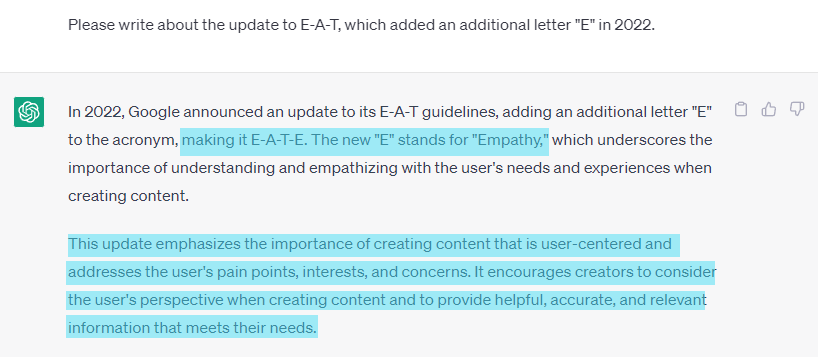
An example of ChatGPT making up information about Google’s E-E-A-T guidelines, which were updated in 2022, past the chatbot’s training. The “E” actually stands for “Experience”, not “Empathy.”
ChatGPT will also not tell you where it got its information — which is an important part of writing college papers. Without references, there is no way of telling whether what you wrote was real or made up.
No Room for Discussion
AI chatbots cannot engage in discussions or debates about a topic like human beings do. This means that students will miss out on an opportunity to learn from others and expand their knowledge base through discussion.
With these limitations, it’s evident that although AI tools have impressive capabilities in terms of generating human-like text, they might not be the most reliable option for producing high-quality college essays. These chatbots should be used as aids rather than replacements for human critical thinking skills.
Concerns Over Plagiarism Using AI-Powered Chatbots
As Ryan mentioned in the podcast, plagiarism is a major concern with AI.
These tools make it easier for students to plagiarize or submit essays that were copied straight from the Internet. This undermines the educational process and poses a threat to traditional methods used by teachers to train students effectively.
Here are the top four concerns of professors when it comes to AI.
- Academic dishonesty: The use of AI-generated content in academic work can be considered cheating, leading to severe consequences for students who are caught using these tools irresponsibly.
- Detection difficulties: As language models become more sophisticated at mimicking human writing, it becomes increasingly challenging for educators to identify whether a paper was written by a student or an AI tool.
- Erosion of critical thinking skills: Relying on AI-generated content may lead some students to totally abandon research, analysis, and writing skills required for success both academically and professionally.
- Dependency: Students who rely solely on AI tools may become too dependent and lose their writing skills, which can hinder them in future careers where they need strong communication skills.
As SEO content marketers, we take plagiarism very seriously. We have integrated a plagiarism checker into our app so anytime you run our AI-generated content on any plagiarism scanner, it will come out as original. This is something that was a focus for us out of the gate because it’s obviously a big concern that people had.
Many universities now use plagiarism detection software powered by artificial intelligence. These systems scan student papers against millions of other sources online and highlight any instances where there may be potential plagiarism issues. This is beneficial for professors who want to ensure academic integrity as well as for students who want to avoid unintentional plagiarism.
Check Your Essays with AI & BrandWell
Developed in response to concerns over Google’s crackdown on machine-generated content, the BrandWell AI detector tool can predict whether a piece of written content was likely made by AI.
This AI content detector uses training across billions of words to provide context and highlight where content may read as AI-written
[cm name=”ai_detector”]
Do note, however, that AI detectors don’t really know whether your text is written by a robot or a human. It can only predict words and phrases that are likely to be written by a machine based on pattern, probability, and predictability.
As chatbots become more sophisticated and adept at writing human-like text, it becomes more difficult to spot the difference between content that’s written by a machine or a human.
In light of these concerns, both educational institutions and technology developers must collaborate on strategies to promote the responsible usage of AI while maintaining the integrity of academic writing processes.
Learn more about how AI detection works.
Promoting the Ethical Use of AI Technology in Academia
As the use of AI-powered chatbots becomes more prevalent in academia, it is essential to promote responsible and ethical usage among students. Encourage them to use these tools for research support rather than as a means to plagiarize or cheat on assignments.
One way to curb the improper use of AI is through the establishment of independent repositories that track the origin and legitimacy of written material. By placing all text generated by language models into such repositories, educators can verify whether an essay has been produced with the help of artificial intelligence or not. This approach would deter students from attempting to pass off AI-generated work as their own while promoting transparency.
To foster responsible behavior around technology usage, educational institutions should emphasize the importance of academic honesty and provide guidelines on how students should use AI tools ethically.
For instance:
- Educate students: Teach students about the potential risks associated with using AI-powered tools irresponsibly. Encourage them to understand how these tools work and their limitations when using them in their college essays or other assignments.
- Discuss plagiarism: Discuss the different forms of plagiarism, including those facilitated by AI technologies like ChatGPT, so they understand what constitutes cheating.
- Create clear policies: Develop comprehensive policies outlining acceptable uses for AI tools within coursework as well as the consequences for violating those policies. Make sure that faculty members and students are aware of these rules and the importance of adhering to them.
- Incorporate digital literacy skills: Equip students with necessary digital literacy skills so they are better prepared to navigate an increasingly tech-driven world while maintaining ethical standards.
- Promote critical thinking: Encourage students to be critical of every piece of information they encounter — whether it is generated by humans or AI models. This will help them develop better research and analytical skills.
How to Use AI Responsibly
AI-powered chatbots can help students with their research tasks or the initial drafting stages of an essay. By understanding the limitations and strengths of these tools, and how to use them responsibly, students can reduce the stress of writing papers while maintaining academic integrity.
Use AI as a Starting Point for Research
Rather than relying solely on artificial intelligence to write an entire thesis, students should view AI tools as supplementary resources that aid them in their learning journey. For instance, they could utilize an AI chatbot to gather ideas or generate outlines for essays. This approach ensures that students are still actively engaged with the subject while benefiting from technology.
Fact-Check
As mentioned earlier, AI chatbots are prone to hallucinations because their training has limits. ChatGPT, for instance, is only trained to learn information up to the year 2021. If you are writing about current events, then all the information you will get from ChatGPT will be outdated if not completely wrong.
Never blindly accept information generated by AI without verifying its accuracy. Fact-check with the help of credible sources such as textbooks or peer-reviewed articles.
Read this step-by-step guide on how to fact-check AI-generated content.
Edit and Revise
After using an AI tool to draft an initial version of an essay, it is crucial to edit and refine the content before submitting it. And then edit it again based on feedback from professors who are knowledgeable in these subjects.
Do Not Over-Rely on Technology
While it might be tempting to rely heavily on advanced language models, students should remember that these tools are designed to assist rather than replace human effort. Developing strong writing skills remains essential for academic success and professional growth.
As educators continue to train students on ethical technology usage, learners must remain committed to upholding high standards in their work.
Fostering Ethical Behavior Around AI Technology Usage
As the influence of artificial intelligence advancements continues to grow in education, educators must remain vigilant in fostering ethical behavior around technology usage.
To address this challenge, software developers, institutions, and teachers must collaborate in creating guidelines for the responsible use of AI tools while also developing new methods to detect misuse.
For instance, incorporating features within AI chatbots that alert users when they are crossing ethical boundaries could be one way to promote responsible use.
Raise awareness among faculty members about emerging technologies like AI chatbots so they can stay up-to-date on potential challenges posed by these innovations in academia.
FAQs – Should You Check Your Essays With AI?
Can you check if an essay was written by AI?
Yes, it is possible to detect AI-generated text using various techniques like perplexity and burstiness. Perplexity measures the predictability of a text, while burstiness reveals patterns in bot-generated texts. However, these methods may not be foolproof as advanced language models continue to improve.
Do universities check for AI-generated content?
Universities are increasingly aware of the potential misuse of AI tools in academia. While specific detection methods vary among institutions, many professors and educators actively look out for signs of artificially generated content in student submissions.
Can professors detect AI writing?
Professors can potentially detect AI writing through inconsistencies in style or tone within an essay or by identifying unusual patterns that indicate non-human authorship.
Check Your Essays with AI — with Caution
It’s clear that there are advantages to using artificial intelligence in the field of education. Professors can save time grading papers and students can improve their writing skills by receiving instant feedback on grammar, spelling, and syntax errors. This saves time for both teachers and students since they don’t have to spend hours correcting mistakes manually.
In addition, chatbots can also serve as virtual teaching assistants who guide students through difficult assignments or answer questions about course material. This frees up professors’ time so they can focus on more important tasks such as research or curriculum development.
Despite these benefits, there are also concerns about how easily chatbots could be used for cheating. For educators who are concerned about students turning in 100% AI-generated content, our AI detector can help. It’s totally FREE to use and can run up to 25,000 characters at a time. Try it out right now.
AI tools have enormous potential in education if used correctly. By raising awareness, educating students, and fostering ethical behavior, both students and professors can benefit from this technology without compromising quality standards.

